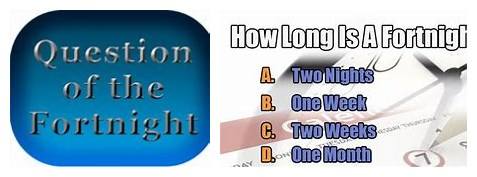Secretly, “fortnight” is a code word, a contraction of “fourteen nights”. But the latter term is a 3 syllabled mouthful, which, with frequent use, slides into the palatable ease of “fortnight”. (Contraction pending!)

How long is a fortnight? The very question is odd to a British mind, since (archaic as it may be) the word is still in common English usage on this side of the pond. Indeed we still speak of “Factory Fortnight” as being the two weeks at the beginning of summer when all of the factories closed to allow their workers the annual trip to the seaside. This seems so “Thomas Hardy” but it was still prevalent only 20-or-so years ago.
Such compounds aside, it is still the everyday phrase: in a fortnight’s time, Tuesday fortnight, we’re going for a fortnight, a fortnight’s holiday we hardly ever say “two weeks”.
Fortnight in USA
The term “fortnight” is the equivalent of fourteen consecutive days or two weeks and is in daily use in England, Scotland, Wales, Ireland, Canada, New Zealand and Australia and other countries that formed part of the old British Empire, though it is little known in the USA. The term fortnight is a contraction of the phrase “fourteen nights”. It derives from the Old English. Many languages do not have a specific term for this two weekly period and use the term bi-weekly or similar instead.
Though the USA does not use the term many of their accounting periods and salary payments are based on the English system of breaking the year down into periods of fourteen nights. The Latin countries tend to use the system of 15 nights rather than 14 nights.
So how long is it then?
Fourteen nights (and days), two sennights, two weeks
A fortnight is:
- …an eon in politics (given that a week “is a long time”)
- …forever while you’re on holiday, but a split-second once you return
- …time enough for a war to be fought twice over (cf June 1967)
- …or for a war to be averted (Cuban missile crisis 1962)
- …the time it takes to pickle an onion
- …half the time it takes to get over the embarrassment of being “pickled”
- …scarcely time enough to live
- …but too long to take to die
- …nearly half of Lent
- …so time to repay
- …half a month of misery
- …or 1.2million seconds of joy
- …time enough to lose a friend
- …or long enough to fall in love
Another term similar to fortnight is se’night or sennight which can often be seen in the writings of Jane Austen. It is used several times in her novel Pride and Prejudice. This is an old English word meaning seven nights which has fallen out of favour and been replaced in general English usage by the word “week”.
As with all of these terms, fortnight, sennight, week, day, year, hour they are all ways we humans measure the passing of time, something that seems to be a bit of an obsession with us all.

